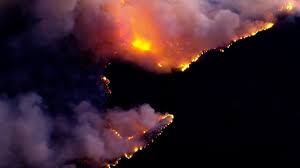
On this day in 1872, President Ulysses S. Grant signed the Yellowstone National Park Protection Act, making Yellowstone the nation’s first national park. Recently my husband and I visited the far younger and less visited Big Bend National Park, in Texas, so I thought I’d give a shout-out to our national parks at a time when they and so much else are being assaulted instead of protected. Call it a trip report with politics (you know I can’t help myself).
Why Texas, you may ask? Quite simply, we wanted a winter hiking destination, and more northerly and high-elevation parks are under snow. The other place we considered was in and around the northeast part of Los Angeles, where our daughter lives, but it’s just as well we chose Big Bend, given that a lot of the trails we wanted to explore are now charred ruins (our daughter is fine).
Speaking of charred ruins, there is a lot of post-apocalyptic terrain to traverse in order to get to Big Bend National Park. We’re (somewhat ambivalent) fans of the streaming series Landman, which mostly takes place in Midland, where we flew into to start the four-hour drive to Big Bend.
The Midland of Landman seemed like one of the least appealing places on the planet, but it turns out the show features the golden-tinged, Vaseline-on-the-camera-lens gauzy version. IRL, we drove through miles and miles of flat, drought-scorched desert littered with metal warehouses, rusty machinery, and trash. The giraffe-like bobbing oil derricks added a touch of mechanized whimsy to the hellscape. At least there was no traffic. And the Border Patrol officers at a checkpoint an hour and a half north of the border were very polite.
Big Bend, thankfully, was prettier. At least we hoped it was, since it was well past dark when we checked into the Chisos Mountain Lodge, the only place in the park to stay that isn’t a campground (it’s about to close for a 2-year renovation). Luckily, it’s in the heart of the most beautiful part of the park–the photo above was taken from the parking lot, and most of the trails we hiked started from the lodge.
Two weeks before we got to Big Bend, there was a cold snap, with temperatures as low as 15 degrees. During our time, the highs were mostly in the mid-80s, and in the high 90s in the river and desert portions of the park. Luckily, we’re early risers who hit the trails by 7:30 every day, allowing us to sit on the lodge’s shady patio and read in the afternoons. The patio and the visitor center were the only places with wi-fi, and there was zero cell coverage, so our news intake was blessedly limited.
We loved the Lost Mine Trail so much that we did it twice:





There we met Tom, a lovely volunteer ranger who hails from Vermont and waxed enthusiastically about everything Big Bend: the geology, the birds, the tight-knit group of rangers and volunteers who spend a lot of time carrying extra water on the trails for unprepared tourists. I wonder how Tom and his merry band are faring now that the Trump/Musk wrecking ball has hit the national parks with frozen funds and massive layoffs. Maybe the birds will still be fine, even though this roadrunner was on the soon-to-be-demolished patio, mostly admiring his reflection in the glass.


But we were there in the relatively innocent days of unfit cabinet nominees being rubberstamped by spineless Republicans; the annihilation of USAID was just over the horizon, and sparse wi-fi preserved our sanity. So let us resume our carefree, if hot, hiking of the Pinnacles, South Rim, and Laguna Meadows trails:



If you’re noticing a lot of brown leaves, that’s because there’s been a two-year drought in southwest Texas. Another ranger told us that nature could withstand another year without permanent major damage. It remains to be seen how much more damage we can sustain.
Sparse water meant the Rio Grande wasn’t all that grand, but nonetheless, Santa Elena Canyon was one of our favorite places, a narrow chasm with Mexico on one side, the US on the other, and a slim ribbon of water running down the middle, the clarity and stillness of the river creating the cliffs’ mirrored doubles. Our two countries, so close and yet so far, seemingly one and the same place and people. If only. I thought of the beautiful book by Francisco Cantu, The River Becomes a Line: Dispatches from the Border.



We did not go to the Rio Grande Village, a legal point of entry where people wade across the river between Mexico and the US. A ranger advised us to get there by 7:30 am, since it would be 97 degrees there. She also recounted her trek on a completely exposed trail through prickly pear cactus on a mission to rescue tourists suffering from heatstroke, and how she hadn’t wanted to go back since. Not having packed our passports anyway, we took her advice, and stayed in the mountains. We wonder if this nice ranger still has her job. Or maybe she, Tom, and the rest of them are part of the Deep State?

There was one more trail to do from the Lodge, and aside from the fact that the Window Trail descends, forcing you to ascend when the cool of the morning is past, it’s a beauty, especially with a scramble up to the top of the Oak Springs Trail:






It was a short jaunt from our room to the Window Viewpoint, a lovely sunset ritual:


And my favorite view of all, flying home to the bejeweled Bay Area on the approach to SFO. Home, sweet, home!







































